The variety of trade export goods has also dropped, the study found, with 1,645 fewer types of British products exported to every EU country.
The authors said this is due to smaller British producers giving up on exporting consignments to some EU nations after facing increased red tape.
Mary Quicke of Quicke’s Cheeses in Devon told the BBC’s Today programme that she had found it “really, really difficult to deal with all the regulatory burdens”.
She said she used to supply four customers directly in the EU but “we had to give them away to somebody else”.
“We just don’t have the people to do the paperwork.”
The report said: “The negative impacts of the [trade agreement] have intensified over time, with 2023 showing more pronounced trade declines than previous years,” it said.
Jun Du, one of the authors of the research, told the BBC there had been an increase in regulations such as “product standards, safety checks and labeling requirements”.
“While these measures do protect consumers, competition and the environment, they also increasingly bring difficulties and costs for the traders,” she said.
Agrifood, textiles and materials manufacturing (wood and paper) have been hardest hit, according to the study.
Trade with more distant countries in the EU has also been impacted the most, including Commonwealth allies such as Cyprus and Malta.
However, the report’s authors say a small number of sectors have proven resilient, especially in terms of exports to bigger EU economies such as Germany and France.
The tobacco, railway and aircraft sectors saw increases in the variety of exports to EU nations.
Credit: Source link










